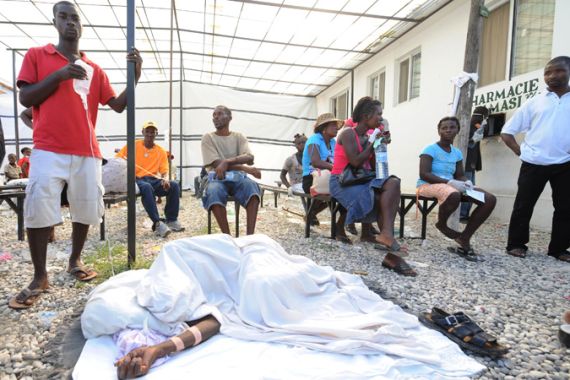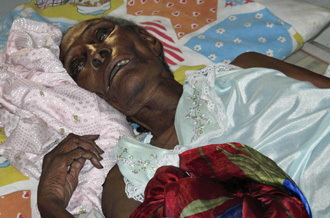Haiti cholera death toll nears 200
Outbreak threatens capital Port-au-Prince amid suspicion that actual number of deaths could surpass official figure.

The United Nations says that 194 Haitians have died in an outbreak of cholera that is threatening to spread to the capital, Port-au-Prince, endangering hundreds of thousands of earthquake survivors sheltered in camps there.
The announcement on Saturday came as the disease began to spread outside the worst-affected rural Artibonite region, triggering fears that the toll could be significantly higher.
Keep reading
list of 4 itemsCould shipping containers be the answer to Ghana’s housing crisis?
Thousands protest against over-tourism in Spain’s Canary Islands
Holding Up the Sky: Saving the Indigenous Yanomami tribe in Brazil’s Amazon
Officials in Haiti have admitted that they have not been able to visit all the areas, suggesting that many cases may not have been reported.
The UN Office for the Coordination of Humanitarian Affairs said that 2,364 people have been sickened in the outbreak.
An Al Jazeera producer who visited the National Hospital in the capital on Saturday saw two patients being treated for suspected cholera. They were treated alongside other patients before being isolated.
The first two cholera cases outside the Artibonite region were confirmed in Arcahaie, a town closer to the capital. Experts were also investigating possible cases in Croix-des-Bouquet, a suburb of the capital, and radio reports said there were two dozen cases of diarrhoea, which can be a symptom of cholera, on Gonave Island across the Gulf of Gonave from the capital.
Medical facilities in the port city of Saint-Marc were overcrowded with patients suffering from dehydration and diarrhoea – symptoms of cholera. The two suspected patients spotted at the National Hospital had come from Saint-Marc.
|
“There were bodies piling up in the morgue” Sebastian Walker, Al Jazeera correspondent |
Al Jazeera’s Sebastian Walker, who visited the area on Saturday, said he saw first-hand the “extreme nature” of cholera during a visit to Saint-Marc.
“There were in that hospital people dying every time we visited … there were bodies piling up in the morgue,” he said. “So certainly in that area…the situation is incredibly serious”.
According to the UN, the Saint-Marc river has tested positive for cholera, Walker said, yet people are still drinking from it and using the river water to wash their dishes.
Aid groups and the government were rushing medical teams, medicine, clean water and water purification to the affected areas. The health ministry also declared a state of emergency in Artibonite.
‘Very dangerous’
If the disease spreads into camps where those left homeless by the January 12 earthquake are sheltering, a public health crisis could be imminent. Sanitation in the camps is poor and the displaced have little access to clean water.
“It will be very, very dangerous,” Claude Surena, president of the Haitian Medical Association, said. “Port-au-Prince already has more than 2.4 million people, and the way they are living is dangerous enough already. Clearly a lot more needs to be done.”
This is the first time cholera has struck Haiti since 1960, according to the UN.
More than 250,000 people were killed in the earthquake and another 1.2 million left homeless.
Jille Sanatus, a 55-year-old, was brought in by his son, Jordany. A doctor was struggling to stick a needle into his arm to place a drip.
“He’s completely dehydrated, so it’s difficult. It’s hard to find the vein,” Doctor Roasana Casimir said.
Casimir finally penetrated the vein and fluid began to trickle in, but half an hour later Sanatus was dead.
 |
| Cholera can kill within hours if not treated in time [AFP] |
Two hospital employees carried the body to the morgue behind the hospital and placed it on the ground for the family to reclaim for a funeral.
Sanatus’ son said the family had been drinking water from a river that the health minister has said tested positive for cholera.
Officials urged residents to take preventative action.
“One of the simplest things they can do is frequent handwashing. Personal hygiene. That does wonders,” Jon Andrus, the deputy director of the Pan American Health Organisation, said.
“Chlorine is being provided so to take advantage of those measures that will ensure that anything ingested whether it be water or food is properly prepared and that the source of the water is safe and adequately treated.”
Andrus said the number of cases will continue to grow because Haitians do not have any built-up immunity to cholera.
“As we know from our experience, with situations of cholera where there is no infrastructure to deal with the crisis, it just gets much worse. We have to expect that and react to it.”
Unclean water
Cholera is transmitted by water but also by food that has been in contact with unclean water contaminated by cholera bacteria. The disease is easily treatable by rehydration and antibiotics but can kill within hours if not treated.
With a health system already in crisis, the outbreak is posing a serious threat to Haiti.
Haiti is the poorest country in the western hemisphere. Only about $95 per person is spent on health care each year, and the country is heavily dependent on international relief organisations to provide medical aid.
The earthquake, which destroyed much of the country’s infrastructure, dealt another blow to an already battered system.
The disaster destroyed 60 per cent of the existing health facilities in the worst affected areas and 10 per cent of medical staff were either killed or left the country, according to Medecins Sans Frontieres.
About one million Haitians, or about 10 per cent of the population, are living with little or no sanitation.